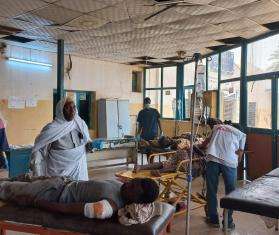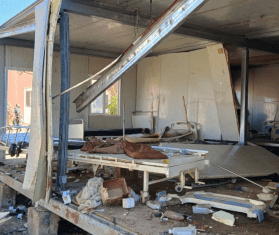Two years ago, the United Nations classified 26 conflicts in the world as "complex emergencies" and quantified their impact: some 59 million people affected—the majority in Africa. Civilians accounted for 90% of the victims—half of those who died were children. To their side, relief teams such as those of Doctors Without Borders/Médecins Sans Frontières (MSF), attempt to alleviate the suffering.
CNN may portray our volunteers as physicians, stethoscope in hand, treating patients in a remote or besieged health-post, but the day to day challenge of humanitarian workers is not just in providing medical care. It also means to negotiate access to populations at risk and to fuel or confront media reporting on the crises we witness. It means to advocate for the respect of basic human rights and humanitarian law, and, hopefully, through our presence, to help in the protection of civilians.
The key message that our teams have learned, if not the intellectual framework that Médecins Sans Frontières started with, is that effective humanitarian action demands an acute awareness of human rights and a vigilant sensitivity to the interaction of the humanitarian agenda with political, military, legal and economic arenas.
Building on the experience of our teams worldwide, I've identified three key issues that we need to address if we want the international community to successfully tackle the wave of "uncivil" civil wars and their appalling human rights records: the lack of an effective conceptual framework; the relativity of humanitarian law; and the ambiguous dynamics of the mediating actors.
LACK OF AN EFFECTIVE CONCEPTUAL FRAMEWORK
First I would like to remark on the lack of an effective conceptual framework. Three concepts of peace have been developed and adapted at different times over the last three centuries.
The first one, that of Montesquieu, of the British Liberals, is that of "peace by commerce": that business interests will ultimately arbitrate the destructive passions of man. It is the classical liberal paradox that the sum of private selfishness provides for the public well being.
The second concept, which appeared in the 19th century, is "peace by reason". That is, that the progress of knowledge would fight ignorance, the real cause of suffering and violence.
The third concept, mostly illustrated in today's debate about the International Criminal Court on this the 50th anniversary of the Universal Declaration of Human Rights, was that of "peace by law", as guaranteed by institutions.
All three concepts still have strong footing these days, sometimes merge, but often conflict. When seeking to improve international crisis response, the lack of an all-encompassing policy framework is appalling and the divide between the various actors is great.
What is the point of a humanitarian actor using the concept of "peace by law" to argue for the protection of Rwandan refugees in the Democratic Republic of Congo? The massacres orchestrated with the complicity of the country's political leadership who should be made accountable, but the formula adopted by the member states supporting this leadership is that of "peace by commerce"!
How do the World Bank, the IMF, on one hand, and the UNHCR on the other hand, coordinate their response to complex emergencies when their conceptual frameworks are so different, and their approaches to the crises entirely specialized? They don't!
THE RELATIVITY OF HUMANITARIAN LAW
My second comment is on the (unfortunate) relativity of humanitarian law.
The Geneva Conventions, the Convention against Torture, the Convention for the Prevention and Repression of Genocide, the UN Charter and a number of other documents seem to protect civilians. Yet during the Cold War, we watched as state and international institutions used the precarious balance of power to flaunt these conventions and never once enacted them against Brezhnev, Pol Pot, Argentinian or Pakistani generals. Even in the 1980's after the Cold War was over, when it came to Saddam Hussein—then a Western ally—using chemical weapons against the Kurds, the conventions were still ignored. And the same thing happened in Chechnya and Rwanda. The noble declarations of intentions, enshrined in the texts of humanitarian law, flourish in UN conferences and international fora, but the practice and logic of member states remain unchanged.
THE AMBIGUOUS DYNAMICS OF MEDIATING ACTORS
And finally I must mention the third factor, the ambiguous dynamics of the mediating actors.
The mediating actors are partly represented around this room: the United Nations, the Member States, and the NGOs. Let's not also forget key local actors such as the military and political leadership, as well as intellectual and community leaders, regional leadership, and others. And, of course, catalysts at every stage are the local and international media outfits.
Let us take a closer look at the humanitarian actors: What is our true ability to work in total independence and strictly according to humanitarian principles? How much influence can donor countries buy with their funding of our humanitarian operations? You will never find it acknowledged, but the "N" of non-governmental does not always stand strong!
Institutions established by the UN charter and associated agencies, have also become suspect of capitulating to the pressures of donor states rather than advocating for the causes enshrined in their mandates. A case in point was the move by UNHCR in 1992 to propose temporary protection as a response to asylum seekers from Bosnia, while these were mostly fully eligible to standard and full asylum procedures according to the convention. Repeatedly, in recent years, and especially in the Rwanda-Zaire-Congo crisis which is still a hot preoccupation for us, we have felt that the Executive Committee and key funding member states exercised undue pressure on the UNHCR that resulted in an agency policy in the field that offered little support to the refugee populations caught in violence.
Probably among the most fiercely independent NGOs, Médecins San Frontières has had to build a large base of independent, individual donors over the years, hoping that this general public support will not impose politically on our operational deployment. But, we often ask, can't we lose what we have gained in political independence, by our total dependency on whether the media brings a given crisis to public attention? When the US media editorial policy ignores Rwanda, the Sudan or Kosovo because of O.J. Simpson or Monica Lewinsky, what recourse is left to invite private philanthropy, stir indignation and stimulate action?
CONCLUSION
To conclude, I should like to stress that these same three factors who hinder effective response to the crises—the lack of an effective conceptual framework, the relativity of humanitarian law and the ambiguous dynamics of the mediating actors—actually also make prevention quite a challenging task if not an impossible one. Let me quote some examples:
Even though our first appeal for the Balkans dates back to the fall of Vukovar, even though the fall of Srebrenica and the collapse of the so-called "safe heavens" had a rehearsal a year earlier with the bombing of Gorazde, even though the Bosnian disaster was 'en marche" since the recognition of Croatia, how long did it take for a significant military and political involvement in Bosnia? And who is listening to the calls from Pristina today? The Kosovo is the issue of the day, but, like Bosnia, the international community will wait till it's too late.
Working in Kigali at the height of the genocide, we were first hand witnesses to the fact that the Genocide Convention might not be worth the paper it is printed on. Warnings that impunity would further fuel violence in the region, were ignored too, and the Western Rwanda—Eastern DRC region all the way to Kinshasa—is still in the grasps of civil war.
Working in Mogadishu, we were, again, first hand witnesses to the failure of a peace-enforcement mission. The US and UN military and political leadership had ignored the warning given by humanitarian actors who saw the writing on the wall with regards to the escalation of violence that finally ended the mission and sent the chills through the spines of the most eager interventionists.
But across the years, and despite these failures, we have retained our commitment. This commitment is often fueled and inspired by the special courage of those men and women whom we meet, who in the midst of war, when their societies are torn apart and they are facing great personal risks, still stand up for the values they uphold, and advocate for the respect of human rights and humanitarian law.
Our commitment is also forged by our volunteers in the field, who remain pragmatic idealists despite the complex realities they face in dealing with humanitarian crises around the world.
I will end on the words of one of these volunteers, Dr. Zechariah, who in his testimony to the International Tribunal for Rwanda, illustrates perfectly the nature of this commitment.
"I have decided to come here—at the Tribunal—because what we saw in Rwanda proved to us that our bandages, our sutures, can never heal the deep wounds of Rwanda. What they need is justice. [...] All those people, all those patients that I had treated have been killed. The lives we had saved were killed before our eyes.
"I lost my friends, my colleagues, everything. And this is why, when I was on the bridge that separated Rwanda and Burundi, standing on this bridge counting the bodies, watching the corpses of mutilated children and women, thinking of the thousands and thousands of bodies I had seen, I swore to myself that if there is a judicial system in this world, those people will pay for their crime."



